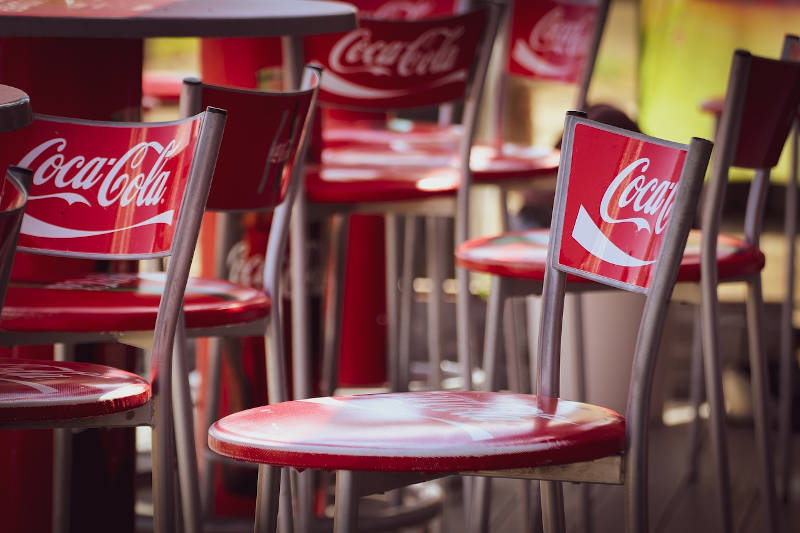 When you first look at the picture to the left, what is the first thing that comes to mind? For the average consumer, the answer is Coca-Cola. Even though the can is not identified, most people associate the color of the can as a Coca-Cola product. This is a perfect example of how branding can have a very strong influence in customers’ perceptions. In this article, we will explore the concept of brand equity and how Coca-Cola has harnessed its power to create an iconic image that resonates with consumers worldwide.
When you first look at the picture to the left, what is the first thing that comes to mind? For the average consumer, the answer is Coca-Cola. Even though the can is not identified, most people associate the color of the can as a Coca-Cola product. This is a perfect example of how branding can have a very strong influence in customers’ perceptions. In this article, we will explore the concept of brand equity and how Coca-Cola has harnessed its power to create an iconic image that resonates with consumers worldwide.
What Is Brand Equity?
Brand equity is the value a company gains from its brand name, logo, symbol, or design beyond its functional attributes. It represents the intangible assets of a business and can significantly impact consumer perceptions, preferences, and purchasing decisions. Brand equity is built over time through consistent messaging, high-quality products, and positive customer experiences, creating an emotional connection between consumers and the brand.
Coca-Cola’s Iconic Red Soda Can: A Masterclass in Brand Equity
Coca-Cola’s red soda can is a prime example of successful brand equity. The use of the red color in Coca-Cola cans is consistent with the company’s overall branding strategy and helps their products to stand out on store shelves and in advertisements. This consistency helps consumers instantly recognize the product, which builds familiarity and reinforces brand identity.
Here are some factors that contribute to Coca-Cola’s strong brand equity:
Consistent Messaging
Coca-Cola consistently communicates themes of happiness, optimism, and refreshment through its marketing campaigns, reinforcing the brand values and strengthening its emotional connection with consumers.
High-Quality Products
Coca-Cola’s commitment to quality products ensures that customers associate the brand with positive experiences, further solidifying its reputation as a trusted and reliable choice.
Positive Customer Experiences
By creating memorable and engaging customer interactions, Coca-Cola fosters long-term loyalty and encourages word-of-mouth marketing, which contributes to its powerful brand equity.
The Benefits of Strong Brand Equity
A strong brand equity offers numerous advantages for a company, including:
Differentiation from Competitors
A distinctive and recognizable brand image allows companies to stand out in crowded markets, making it easier for consumers to identify their products and services.
Premium Pricing Power
Brands with high levels of brand equity can charge higher prices for their products, as customers are willing to pay a premium for the perceived value and quality associated with the brand name.
Customer Loyalty
Strong brand equity fosters loyalty among customers, who become repeat buyers and advocates for the brand, contributing to its growth and success over time.
Building and Maintaining Brand Equity
Building and maintaining strong brand equity requires a long-term commitment to consistent messaging, high-quality products, and positive customer experiences. Here are some strategies businesses can use to develop their brand equity:
Establish a Clear Brand Identity
Define your brand’s mission, vision, values, and personality to create a unique and cohesive image that resonates with your target audience.
Consistently Communicate Your Brand
Ensure that all marketing efforts reflect your brand identity, from visual elements like logos and color schemes to messaging and tone of voice.
Deliver High-Quality Products and Services
Continuously strive for excellence in every aspect of your business to ensure that customers associate positive experiences with your brand.
Engage with Your Customers
Foster long-term relationships by actively listening to your customers, addressing their needs, and creating memorable experiences that encourage loyalty and advocacy.
In conclusion, Coca-Cola’s iconic red soda can demonstrates the power of brand equity in shaping consumer perceptions and driving business success. By consistently communicating its values, delivering high-quality products, and fostering positive customer experiences, Coca-Cola has built a strong emotional connection with its customers, setting itself apart from competitors and solidifying its position as a global leader in the beverage industry.

